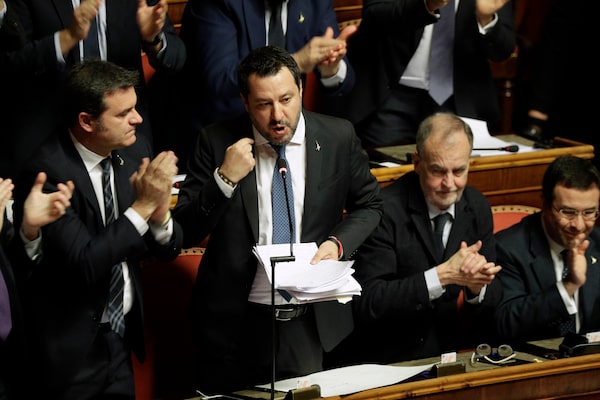
Opposition populist leader Matteo Salvini speaks at the end of the debate at the Italian Senate on whether to allow him to be prosecuted as he demands to be -- for alleging holding migrants hostage for days aboard coast guard ship Gregoretti instead of letting them immediately disembark in Sicily, while he was interior minister, at the Senate in Rome, Wednesday, Feb. 12, 2020. Salvini says being on trial for alleged kidnapping is tantamount to defending his country from illegal migrants he blames for crime and for subtracting jobs from Italians. (AP Photo/Andrew Medichini)Andrew Medichini/The Associated Press
The career of Matteo Salvini, Italy’s most ambitious and powerful populist, took another blow on Wednesday, when Italian senators voted to lift his immunity over accusations that he illegally detained migrants at sea.
The decision means that Mr. Salvini, leader of the poll-topping, far-right League party, will face a criminal trial in Sicily that has the potential to land him in prison and end a high-flying political run that had put him in pole position to replace Giuseppe Conte as prime minister.
In December, magistrates in the eastern Sicilian city of Catania ruled that Mr. Salvini should be tried for preventing 131 African migrants from disembarking from an Italian coast guard ship that had rescued them in the Mediterranean last July. The migrants were held aboard the ship for six days in unsanitary conditions — abuse of power and de facto kidnapping, the magistrates argued.
Former coast guard commander Gregorio Del Falco, now a Senator, said Mr. Salvini’s refusal to let migrants disembark amounted to "unnecessary cruelty.”
Mr. Salvini, who was then deputy prime minister and interior minister, called Italy “the refugee camp for Europe” and only allowed the migrants to leave the ship after the Italian government worked out a plan with other European Union countries to distribute them among six EU countries, including France and Germany.
Mr. Salvini is also the subject of at least three other investigations over the alleged kidnapping of migrants. On Feb. 27, the Senate will vote on whether to lift his immunity for allegedly kidnapping 164 migrants who were stranded aboard the Spanish rescue-ship Open Arms in August.
While some EU countries and many migrant charities decried Mr. Salvini’s refusal to allow migrant-rescue ships to dock at Italian ports, his fierce ant-migrant status was popular among Italian voters, allowing him and his League party to dominate the two-party coalition that governed Italy at the time. The coalition blew up last August, when Mr. Salvini withdrew his support for the League’s partnership with the anti-establishment Five Star Movement party.
His goal was to trigger an early election which, the polls suggested, would be handily won by the League. A victory would install him as the first populist, extreme-right prime minister of a Group of Seven country. His European goal was to form a nationalistic, anti-migrant alliance with France’s Marine Le Pen, leader of the National Rally party, and Hungarian prime minister Viktor Orban.
The gambit failed. The centre-left Democratic Party, the second-largest party in Parliament, formed an unlikely alliance with the Five Star Movement and launched a new government in September. While the move thrust Mr. Salvini into opposition, the League party has recently won several regional elections, though it lost a crucial election last month in the wealthy and traditional left-wing region of Emilia-Romagna.
On Wednesday, after learning that a majority of Senators had voted to strip away his immunity, Mr. Salvini was defiant. “I want to go to a courtroom with my head held high,” he told the Senate. “Defending the borders was my duty. I am proud of what I have done, for my children and for the children of this country. Let’s have a judge decide if I’m a criminal or if I was just doing my job.”
Mr. Salvini’s League is also facing two financial inquiries into possible money laundering and corruption over suspicions that it tried to raise funding through a secret Russian oil deal. The party denies the accusations.
In spite of all the setbacks, the League is still polling at 30 per cent or greater, suggesting it would place first in an election if one were called tomorrow.
 Eric Reguly
Eric Reguly